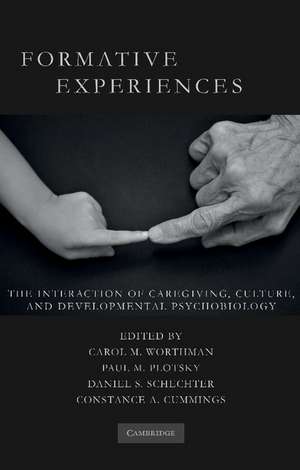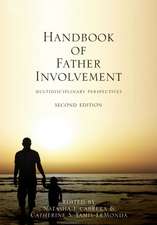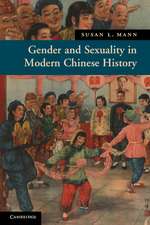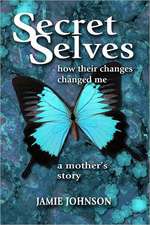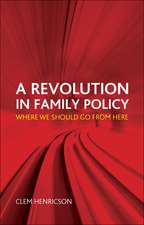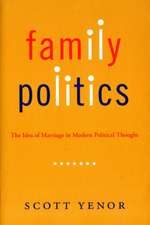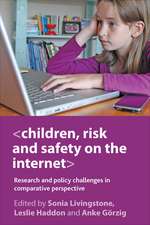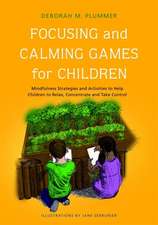Formative Experiences: The Interaction of Caregiving, Culture, and Developmental Psychobiology
Editat de Carol M. Worthman PhD, Paul M. Plotsky PhD, Daniel S. Schechter MD, Constance A. Cummings PhDen Limba Engleză Paperback – 11 dec 2013
| Toate formatele și edițiile | Preț | Express |
|---|---|---|
| Paperback (1) | 419.61 lei 6-8 săpt. | |
| Cambridge University Press – 11 dec 2013 | 419.61 lei 6-8 săpt. | |
| Hardback (1) | 1011.00 lei 6-8 săpt. | |
| Cambridge University Press – 6 apr 2010 | 1011.00 lei 6-8 săpt. |
Preț: 419.61 lei
Nou
Puncte Express: 629
Preț estimativ în valută:
80.30€ • 83.73$ • 66.74£
80.30€ • 83.73$ • 66.74£
Carte tipărită la comandă
Livrare economică 20 martie-03 aprilie
Preluare comenzi: 021 569.72.76
Specificații
ISBN-13: 9781107635180
ISBN-10: 1107635187
Pagini: 622
Ilustrații: 50 b/w illus. 11 tables
Dimensiuni: 152 x 229 x 35 mm
Greutate: 0.9 kg
Editura: Cambridge University Press
Colecția Cambridge University Press
Locul publicării:New York, United States
ISBN-10: 1107635187
Pagini: 622
Ilustrații: 50 b/w illus. 11 tables
Dimensiuni: 152 x 229 x 35 mm
Greutate: 0.9 kg
Editura: Cambridge University Press
Colecția Cambridge University Press
Locul publicării:New York, United States
Cuprins
Introduction Carol M. Worthman and Constance A. Cummings; Part I. Historical, Cross-Cultural, and Developmental Science Perspectives: 1. Plasticity and variation: cultural influences on parenting and early child development within and across populations Robert A. LeVine; 2. From measurement to meaning in caregiving and culture Marc Bornstein; Part II. How Experience Interacts with Biological Development: 3. Epigenetics and the social environment Moshe Szyf, Patrick O. McGowan, Gustavo Turecki and Michael Meaney; 4. Sensitive periods in the early development of mammals Christoph Wiedenmayer; 5. Confluence of individual and caregiver influences on socioemotional development in typical and atypical populations Matilda E. Nowakowski, Louis A. Schmidt and Geoff Hall; 6. We are social - therefore we are: the interplay of mind, culture, and genetics in Williams Syndrome Carol Zitzer-Comfort, Judith Reilly, Julie R. Korenberg and Ursula Bellugi; Part III. Formative Relationships Within and Across Generations: 7. Ethnographic case study: Bofi foragers and farmers: case studies on the determinants of parenting behavior and early childhood experiences Hillary N. Fouts; Commentary Myron A. Hofer; Commentary Klaus K. Minde; 8. Clinical case study: good expectations: a case study of perinatal child-parent psychotherapy to prevent the intergenerational transmission of trauma Amy L. Busch and Alicia F. Lieberman; Commentary Jill E. Korbin; Commentary Emeran A. Mayer and Stefan Brunnhuber; 9. Ethological case study: infant abuse in Rhesus Macaques M. Mar Sánchez, Kai M. McCormack and Dario Maestripieri; Commentary Dante Cicchetti; Commentary Ronald G. Barr; 10. Clinical case study: multigenerational ataques de nervios in a Dominican-American family: a form of intergenerational transmission of violent trauma? Daniel S. Schechter; Commentary Thomas S. Weisner; Commentary Urs M. Nater and Christine M. Heim; Part IV. Social and Cultural Contexts of Childhood Development: Normative Settings, Practices, and Consequences: 11. Ethnographic case study: Inuit morality play and the Danish medical officer Jean Briggs; Commentary Vivette Glover; Commentary Karla Jessen Williamson and Laurence Kirmayer; 12. Ontogenetic perspectives on the neurobiological basis of psychopathology following abuse and neglect Sally B. Seraphin, Martin H. Teicher, Keren Rabi, Yi-Shin Sheu, Susan L. Andersen, Carl M. Anderson, Jeewook Choi and Akemi Tomoda; 13. Ethnographic case study: Maria: cultural change and post-traumatic stress in the life of a Belizean adolescent girl Eileen Anderson-Fye; Commentary Frank W. Putnam; Commentary Anne E. Becker; 14. Sex-gender, culture, and development: issues in the emergence of puberty and attraction Gilbert Herdt; Part V. Fear, Fun, and the Boundaries of Social Experience: 15. Ethnographic case study: Anak PKI: a longitudinal case study of the effects of social ostracism, violence and bullying on an adolescent Javanese boy Robert Lemelson, Ninik Supartini and Emily Ng; Commentary Jaap M. Koolhaas; Commentary Michael D. De Bellis; 16. The evolution of social play Sergio Pellis, Vivien C. Pellis and Christine J. Reinhart; 17. Ethological case study: social stress as a formative experience: neurobiology of conditioned defeat Kim L. Huhman; Commentary Jonathan Hill; Commentary Aaron Jasnow and Kerry Ressler; Commentary James Wilce; 18. The basic affective circuits of mammalian brains: implications for healthy human development and the cultural landscapes of ADHD Jaak Panksepp; Part VI. Public Health, Education, and Policy Implications: 19. Translations from human development to public policy Neal Halfon, Emily S. Barrett and Alice Kuo; 20. Global perspectives on the wellbeing of children Linda Richter; 21. Global perspectives on the wellbeing of children: a response Jennifer Harris Requejo and Flavia Bustreo.
Recenzii
“A wonderful book for all professionals whose work touches the lives of children and their caregivers, and others in allied fields!”
– T. Berry Brazelton, Brazelton Touchpoints Center and Harvard Medical School
“A rich and highly diverse collection of papers that illuminate some of the complex puzzles lying at the interface of development, experience, and biology. Scholars interested in the new evidence on epigenetic processes, Williams syndrome, and cultural influences should profit from this volume.”
– Jerome Kagan, Harvard University
“Formative Experiences is a marvelous collection on the frontier of knowledge about the role of the environment in social and emotional development. Its range of contributions – from the developmental psychobiology laboratory to the exotic cross-cultural field study and the clinical challenges of psychological suffering – make it unique, and the distinction of its authors make it indispensable. It sets a new standard for multilevel analysis in this rich and exciting realm of science.”
– Melvin Konner, author of The Evolution of Childhood: Relationships, Emotion, Mind
"Interdisciplinary cross-cultural research on the formative impact of experiences in childhood, including bullying and other stresses."
–Chronicle of Higher Education
"...The multidisciplinary approach encourages a transactional view of developmental plasticity and variation and includes both animal and ethnographic studies. Excellent commentaries follow many of the chapters and provide undergraduates with excellent models of critiques and discussions... Highly recommended..."
--J. Mercer, emerita, Richard Stockton College, CHOICE
"....Formative Experiences is a must-have for scholars interested in the biology of child development in cross-cultural context. It does a remarkable job of capturing the key points of what must have been a fascinating conference.... Formative Experiences would be an excellent catalyst for an interdisciplinary seminar on child development.... provide a broad playing field for graduate students in anthropology, developmental psychology, human biology, genetics, medicine, neurobiology, and related disciplines....."
--Mark V. Flinn, University of Missouri, American Journal of Human Biology
– T. Berry Brazelton, Brazelton Touchpoints Center and Harvard Medical School
“A rich and highly diverse collection of papers that illuminate some of the complex puzzles lying at the interface of development, experience, and biology. Scholars interested in the new evidence on epigenetic processes, Williams syndrome, and cultural influences should profit from this volume.”
– Jerome Kagan, Harvard University
“Formative Experiences is a marvelous collection on the frontier of knowledge about the role of the environment in social and emotional development. Its range of contributions – from the developmental psychobiology laboratory to the exotic cross-cultural field study and the clinical challenges of psychological suffering – make it unique, and the distinction of its authors make it indispensable. It sets a new standard for multilevel analysis in this rich and exciting realm of science.”
– Melvin Konner, author of The Evolution of Childhood: Relationships, Emotion, Mind
"Interdisciplinary cross-cultural research on the formative impact of experiences in childhood, including bullying and other stresses."
–Chronicle of Higher Education
"...The multidisciplinary approach encourages a transactional view of developmental plasticity and variation and includes both animal and ethnographic studies. Excellent commentaries follow many of the chapters and provide undergraduates with excellent models of critiques and discussions... Highly recommended..."
--J. Mercer, emerita, Richard Stockton College, CHOICE
"....Formative Experiences is a must-have for scholars interested in the biology of child development in cross-cultural context. It does a remarkable job of capturing the key points of what must have been a fascinating conference.... Formative Experiences would be an excellent catalyst for an interdisciplinary seminar on child development.... provide a broad playing field for graduate students in anthropology, developmental psychology, human biology, genetics, medicine, neurobiology, and related disciplines....."
--Mark V. Flinn, University of Missouri, American Journal of Human Biology
Descriere
Explores the formative effects of children's early life experiences, with an emphasis on interactions among neurodevelopmental, behavioral and cultural dynamics.
